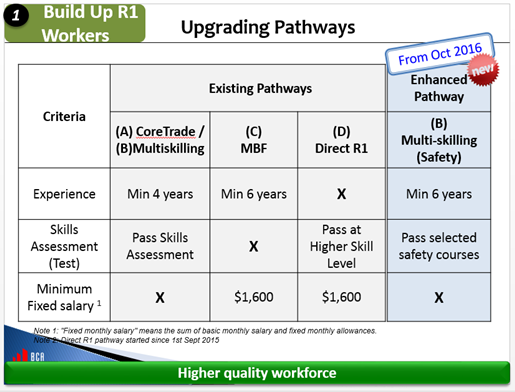Q1: How to upgrade my construction workers? What are the upgrading pathways and criteria?
To retain skilled and experienced construction workers, employers can upgrade them to be “Higher Skilled” R1 workers through any of the 4 upgrading pathways – CoreTrade scheme, Multi-skilling scheme, Market-based Skills Recognition Framework, and Direct R1 pathway.
The criteria of each upgrading pathway are summarized in the table below.

Q2: What are the benefits after upgrading my construction workers to “Higher Skilled” R1 workers?
Under the Ministry of Manpower (MOM) skills and levy framework, “Higher Skilled” R1 workers can stay in Singapore up to 26 years and their employers pay lower levy for these “Higher Skilled” R1 workers. In addition, these workers are more productive and would contribute more to their employers.
Q3: Is there an expiry date to the status of “Higher Skilled” R1 workers?
“Higher Skilled” R1 workers are required to attend the stipulated Continuing Education and Training (CET) within 2 years of attaining their R1 status. BCA will assist to inform employers when the CET is due.
For Direct R1 workers, their first CET would be 2 years from the test date that they have attained SEC(K) at higher skill level.
Q4: What are the objectives of Continuing Education and Training (CET)?
To continuously upgrade the construction workforce to support improvement in productivity, quality and safety, all personnel registered under CoreTrade and Multi-skilling schemes or upgraded through the Direct R1 pathway, are required to attend Continuing Education and Training (CET) under their respective registered trade category.
The CET will be a half-day to 1 day course covering the latest codes and regulations, good practices, and demonstration of new methods, materials, tools and equipment relevant to the specific construction trades and/or areas of responsibility of the registered personnel.